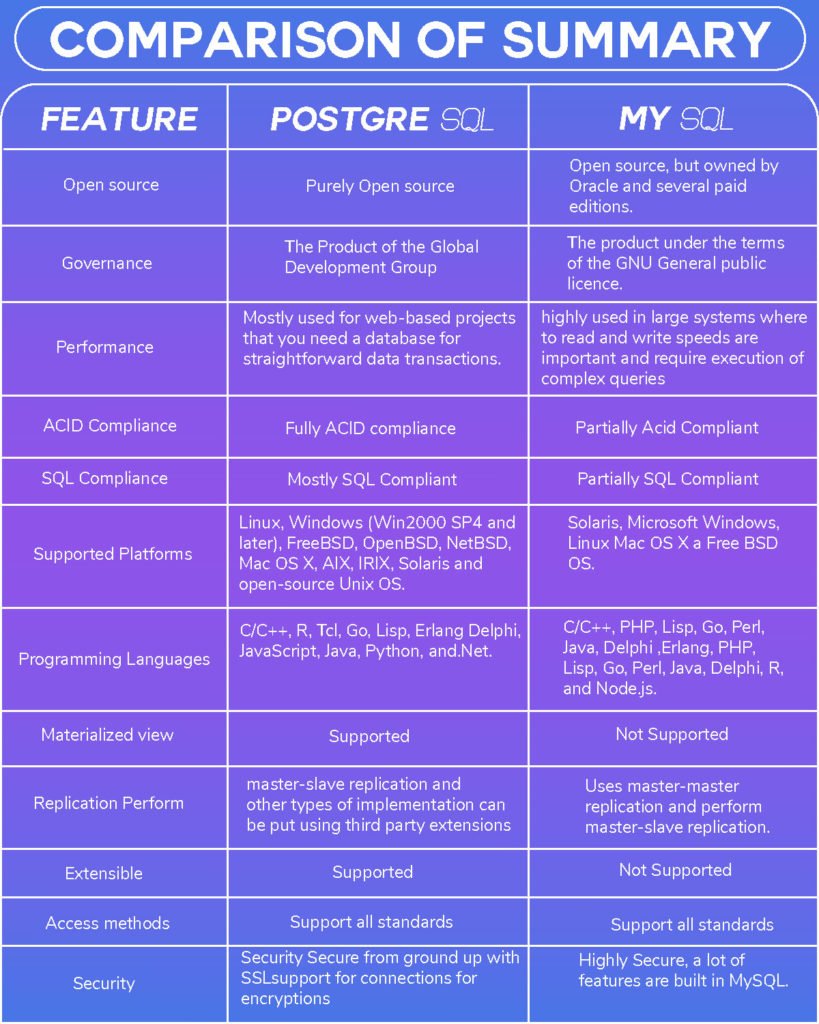
PostgreSQL is perceived as more powerful. Support triggers that can fire on most types of command, except for ones affecting the database globally e.g., roles and tablespaces. For years, the common industry perception has been that MySQL is faster and easier to use than PostgreSQL. This is advantageous in case of large tables with millions of rows. Postgres seems to be faster, benchmarks, I heard Postgres has better support of SQL standards, it has awesome plugins such as postgis, there seems to be more tools and services for it, 'postgrest', 'postgraphile'. MySQL supports covering indexes that allow data to be retrieved by scanning the index alone without touching the table data. Ruby, Perl, Python, TCL, PL/pgSQL, SQL, JavaScript, etc. Programming languages for stored procedures Yes (Supported since MySQL 8.0.16, Before that MySQL just ignored the CHECK constraint) Must be a constant or CURRENT_TIMESTAMP for TIMESTAMP or DATETIME columns Support many advanced types such as array, hstore, and user-defined type.

once data is deleted, it cannot be rolled back. MySQL TRUNCATE TABLE does not support CASCADE and transaction safe i.e. The recent versions of MySQL and Postgres have slightly erased the performance difference between the two databases. PostgreSQL TRUNCATE TABLE supports more features like CASCADE, RESTART IDENTITY, CONTINUE IDENTITY, transaction-safe, etc. Previously, Postgres performance was more balanced, i.e., reads were generally slower than MySQL, but then it improved and can now write large amounts of data more efficiently, making concurrency handling better. MySQL provides performance, speed, and ease of use as primary features. Choosing between the two depends on the specific requirements for a project and a database administrator's experience. Support CASCADE option to drop table’s dependent objects e.g., tables and views. MySQL vs PostgreSQL: Which One Should You Use Both MySQL and PostgreSQL are popular open-source database management systems with unique features. Support the TEMP or TEMPORARY keyword in the DROP TABLE statement that allows you to remove the temporary table only. Comparing the normalized speed of Hibernate with MySQL database server (0.63) to the normalized speed of Hibernate with PostgreSQL database server (29.6). No TEMP or TEMPORARY keyword in DROP TABLE statement Multiple storage engines e.g., InnoDB and MyISAM The world’s most popular open source database. The world’s most advanced open source database. The following table compares the features of PostgreSQL vs. MySQL has been famous for its ease of use and speed, while PostgreSQL has many more advanced features, which is the reason that PostgreSQL is often described as an open-source version of Oracle. Both PostgreSQL and MySQL are time-proven solutions that can compete with enterprise solutions such as Oracle and SQL Server. MySQL is an important decision when it comes to choosing an open-source relational database management system.


 0 kommentar(er)
0 kommentar(er)
